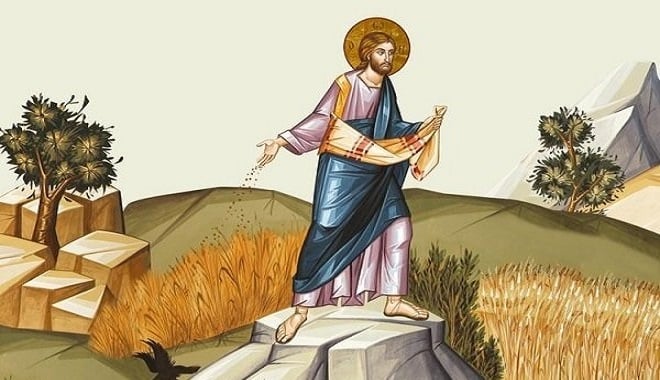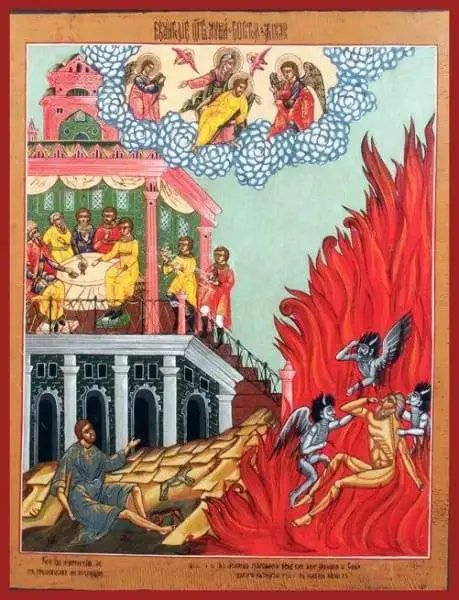A Homily on the Call to the Heavenly Banquet
In the name of the Father, and of the Son, and of the Holy Spirit. Amen.
Beloved in Christ, today’s readings speak to us of a profound truth: our calling to participate in the divine life. The Apostle Paul tells us, “When Christ who is our life appears, then you also will appear with Him in glory.” This glory is not something distant or abstract, but rather the very purpose of our creation – to be transformed into the likeness of Christ.
Consider how Saint Paul continues, instructing us to “put to death what is earthly in you.” He speaks of fornication, uncleanness, passion, evil desire, and covetousness. Saint John Chrysostom, reflecting on this passage, tells us that these sins are called “earthly” not because the earth is evil – for God’s creation is good – but because they keep us bound to merely earthly concerns, preventing our ascent to heavenly things.
This brings us to our Lord’s parable of the Great Banquet. A man prepared a feast and sent his servant to call those who were invited, saying “Come, for all things are now ready.” Yet what do we hear? Each invited guest offers an excuse. One must see his field, the other talks about his oxen, a third has married a wife. Saint Cyril of Alexandria writes that these excuses represent different forms of attachment to worldly things – possession of property, pursuit of business, and pleasures of the flesh.
Let me share with you a story that illustrates this truth. There once was a wealthy merchant in Constantinople who was known for his extensive collection of rare manuscripts. One day, a holy monk visited him, carrying nothing but a worn prayer rope and a small psalter. The merchant, proud of his collection, invited the monk to see his library.
“These manuscripts,” the merchant declared, “contain the wisdom of the ages. I have spent my life collecting them.” The monk nodded quietly and asked, “And how many have you read?” The merchant shifted uncomfortably. “Well,” he said, “I’ve been too busy acquiring them to read many. But one day, when my business affairs are in order…”
The monk smiled gently and said, “My brother, you remind me of those invited to the great feast. Your manuscripts are like unopened invitations to the banquet of divine wisdom. While you busy yourself with collecting more invitations, the feast itself goes unenjoyed.”
This simple story echoes the words of Saint Basil the Great, who wrote, “A man who has two loaves of bread, and eats one and gives the other to Christ’s hungry, feeds him with purpose out of love; but he who has a thousand sacks of wheat and forever puts off giving anything, while he speaks of greater things in the future, is likely never to share even a crumb of bread with Christ in his poor.”
The Lord’s parable continues with the master of the house, angry at the refusals, commanding his servant to “go out quickly into the streets and lanes of the city, and bring in the poor and maimed and halt and blind.” Saint Gregory the Great teaches us that this represents God’s mercy extending to those whom the world considers unworthy. The poor in spirit, those who recognize their need for God, are welcomed to the feast.
Notice, beloved, how both readings converge on a single truth: the need to put aside what Saint Paul calls “the old man with his deeds” and put on “the new man who is renewed in knowledge according to the image of Him who created him.” This renewal is our acceptance of the invitation to the heavenly banquet.
As Saint John of Damascus reminds us, “The kingdom of heaven is not food and drink, but righteousness and peace and joy in the Holy Spirit.” When we make excuses – when we prioritize our fields, our oxen, our worldly concerns – we risk missing the feast that truly matters.
Therefore, let us examine ourselves. What excuses do we make? What attachments keep us from fully accepting the divine invitation? Remember that in Christ “there is neither Greek nor Jew, circumcised nor uncircumcised, barbarian, Scythian, slave nor free, but Christ is all and in all.” All are invited to the feast; the only question is whether we will accept.
Let us pray that God will grant us the wisdom to recognize our excuses, the strength to put aside our earthly attachments, and the grace to accept His invitation with joy. For the banquet is prepared, and our Lord awaits us with love.
In the name of the Father, and of the Son, and of the Holy Spirit. Amen.
Copyright © 2024 The Rev. Adrian Augustus



